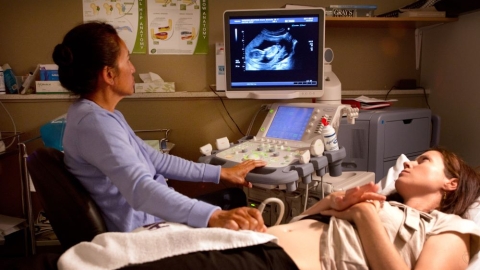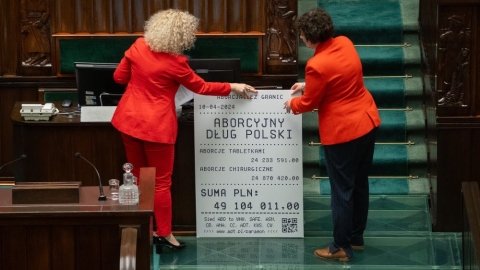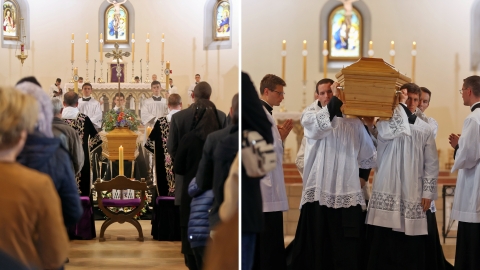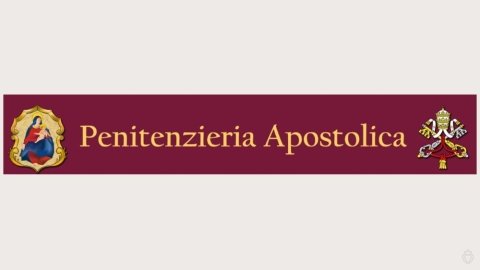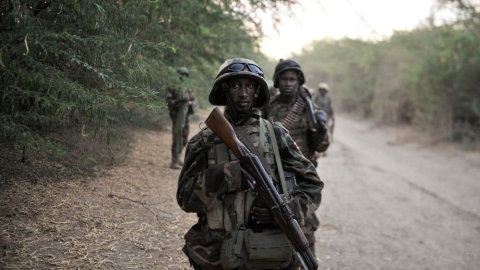Netherlands: A Bishop Speaks Against the Synod
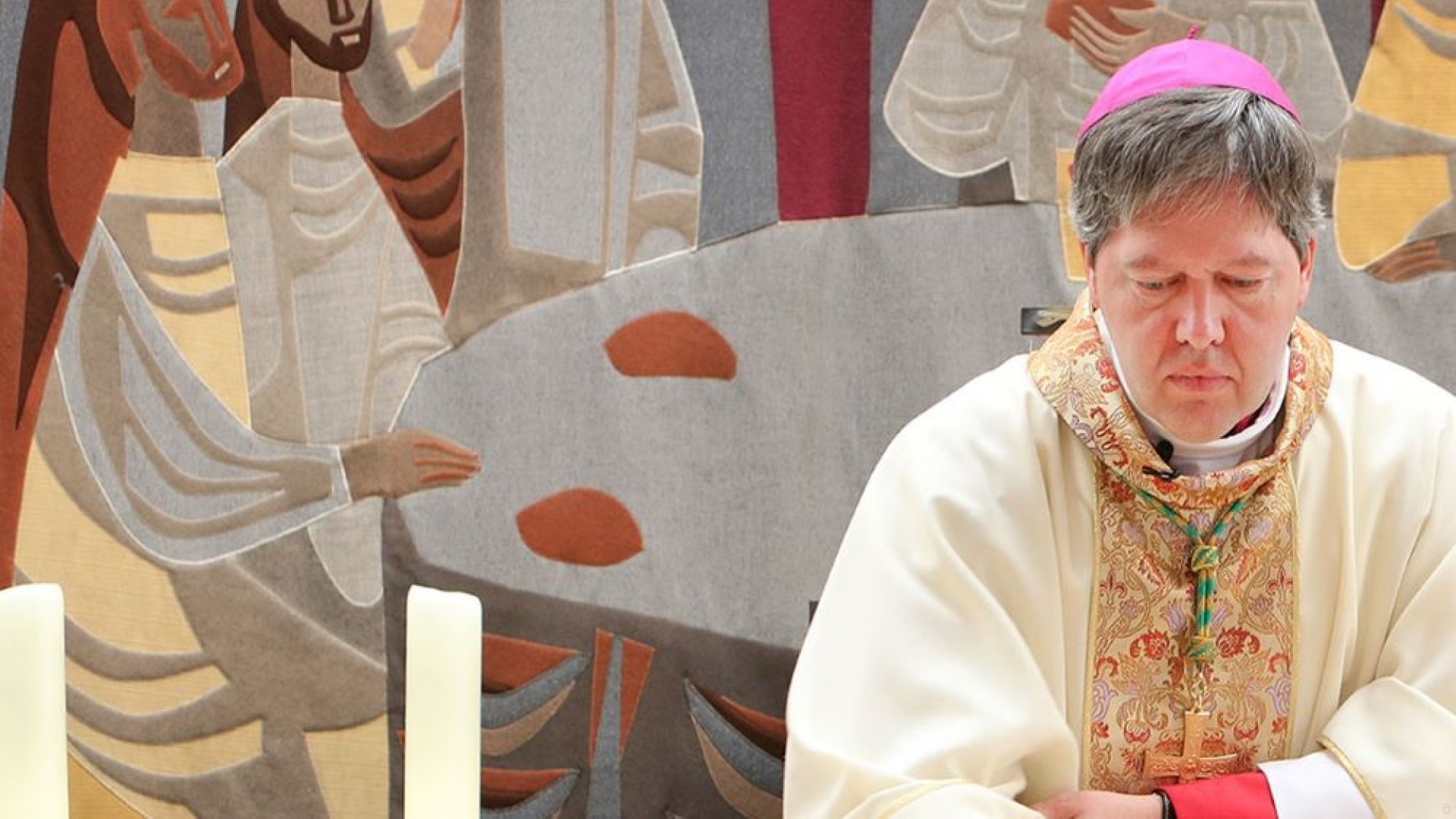
Bishop Robert Mutsaerts
The Synod on Synodality, which was held in Rome from October 4 to 29, 2023, raised numerous criticisms. In addition to the dubia of the five cardinals and the courageous pastoral letter from Bishop Joseph Edward Strickland, Bishop of Tyler, Texas, in the United States, we must add to the file declarations by Robert Mutsaerts, auxiliary bishop of Bois-le-Duc in the Netherlands, reported by Vaticanist Aldo Maria Valli on his blog on October 29.
For the record, last year, Bishop Mutsaerts decided to leave an assembly of which he did not hesitate to say: “God is absent from this ignoble synodal process.”
The Synod of Darkness
“Regarding the Synod on Synodality, the first stage of which has been completed, the Dutch prelate bluntly declares: ‘Whatever synodality may mean, synods are made to discover how we should proceed in the present time to promote people drawing closer to Christ. The problem is that Jesus and the salvation of souls (which is ultimately what matters) have hardly figured in the discussions of this synod.’”
“There was no reference to the Fathers of the Church, to saints and theologians, almost no reference to the Bible and Tradition. The Pope mainly quotes himself, and there is no philosophical thought. Feeling dominates everything and this does not produce clear ideas. If there is one thing that Francis does not do, it is precisely this: produce clarity.”
“This is evident in the responses to the dubia [of the five cardinals]. But without clear ideas, we remain in darkness, we grope in the shadows of the night, and we are left with nothing but illusions more or less close to the truth. But isn’t it true that it is the truth that sets us free? What is the point of emphasizing the pastoral aspect if it is not based on truth?”
Bishop Robert Mutsaerts was born in 1958. He therefore lived through the entire period of the post-conciliar Church. And today he says: ‘Certainly, everyone is welcome in the Church, but on one condition: that they repent and appeal to God’s mercy. This is the central point of our religion: recognizing that there is a truth that has been revealed to us. That’s why we go to church.”
“We must ask for forgiveness and strengthen ourselves with the grace of God using the means of grace: the sacraments, the Word of God, the support of the faith community, with the goal of sanctification.” – Aldo Maria Valli notes on this subject: “Unusual words today, when the Church proclaims welcome without remembering anymore the need for conversion and adherence to the truth.”
The bishop continues: “They want the Church to change her standards, but she cannot! Jesus said to the adulterous woman: ‘Go and sin no more’ (Jn. 8:11). Some instead want the Church to say, for example, to the so-called LGBTQ+ community: ‘Go and continue like this.’”
“If people ask me for a blessing for a type of life that the Church considers a sin, I obviously won’t give it. If there are people who feel excluded, so be it. Because Jesus Himself excluded many people by making it clear that there are people who will not inherit the kingdom of God.”
And he clarifies: “Of course, we must love our neighbor, but we must also be able to call certain actions what they are: sins. Vague and unclear answers so not attract anyone to the Church of Christ. Indeed, adaptation to secular norms distances people from Christ. They feel confirmed in their secular opinions.”
“Jesus's first command to the Church was not listening, but mission: ‘Go therefore and make disciples of all nations, baptizing them in the name of the Father, and of the Son, and of the Holy Spirit” (Mt 28:19).
Related Article:
What Does the Pope Want?
Bishop Mutsaerts is not afraid to directly question Pope Francis: “What does the Pope really want? Why does he invite and receive Fr. James Martin [Jesuit activist for homosexuals]? Why did he choose Cardinal Jean-Claude Hollerich [progressive Jesuit, archbishop of Luxembourg] as rapporteur of the synod when the latter confirmed that in his opinion certain positions of the Church are scientifically and sociologically erroneous?”
“No, dear Cardinal, the positions that you consider wrong have a biblical foundation! And why did the Pope, in the midst of all the synodal turmoil, find time to receive Sr. Jeannine Gramick [also an activist in favor of homosexuals, sanctioned by Rome in 1999], who believes that the Church’s teaching on ethical issues (obviously we are talking about the LGBTQ+ issue) needs to be changed?”
Furthermore, “Why is the Pope making room in his schedule to receive Whoopi Goldberg [American actress, real name Caryn Elaine Johnson], who quickly reported that the visit was fantastic, because the pope accepts gay relationships and is open to the ordination of women?”
“Are the words of the American actress and activist correct? The Vatican has not denied it. I note that Whoopi Goldberg is still a strong supporter of abortion. Would this be synodality? To listen to anyone who has something to say? Does the Pope really support these ideas? And if he doesn't support them, why is he creating so much confusion?”
Aldo Maria Valli opportunely emphasizes that Bishop Mutsaerts asks simple and legitimate questions. However, it is precisely these questions that seem taboo today. And he asks them without hiding his sadness and disappointment. He continues: “The Catholic Church has the longest and richest cultural tradition in the world.”
“But today, the angels cry when they listen to the current ecclesiastical language used by the synod: meaningless, hypocritical, pseudo-sociological, almost psychological. It is as if the Church had decided that its deep and broad heritage, made up of the prophets, the first Fathers of the Church, Greek philosophy, Roman law and all the subsequent history of the saints and sages of our civilization, can be set aside for the love of walking together” [according to the Greek etymology of the word “synod,” sun-odos].
A Church Running After the World
“Not to mention that the synod ‘which seems designed to catch up with the world, is already far behind the world,’ remarks the Dutch prelate. In fact, ‘while the synod member discuss, many others letters have already been added to the LGBTQ acronym.’”
“It is enough to recall that Canadian Prime Minister Justin Trudeau, defending himself against the true accusation of attacking the rights of parents over the education of their children, referred to the need to protect LGBTQ+ people. Will we soon need another synod to address this development? And there are still many unused letters. And also numbers.”
And he warns: “As Catholics, we must be fooled by ideological tricks. If we carelessly accept the use of a term (LGBTQ, etc., etc.) created for ideological purposes, we are very close to intellectual and moral shipwreck.” – It is true that adopting the words of the adversaries of the Church means, in the short term, adapting to their thinking which is hostile to all natural and supernatural law.
“According to Bishop Mutsaerts we need to stop talking about inclusiveness and diversity: ‘We speak using terms such as holy and sinful, sacred and profane, divine and human, good and evil. To truly understand homo sapiens, we need good Christian philosophy and theology. And, in our time, above all we need courage.”
The Synod's rapporteur, Cardinal Hollerich, has repeatedly stated that the assembly does not have the authority to make decisions: all it can do is discern.”
“But this,” comments Mutsaerts, “is a ruse, because the way in which we discuss is already a type of decision-making on what is important and what is not, on what can and cannot be addressed, on what the future government of the Church should be. In short, it suggests what it means to be Catholic today [by popular standards].”
“And they add that all this was inspired by the Holy Spirit! Of course, the Pope could choose to ignore all this. But the fact is that it was precisely he and his closest allies who arranged things this way.”
(Source : Aldo Maria Valli – Trad. à partir de benoitetmoi/DICI n°438 – FSSPX.Actualités)
Illustration : bisdomdenbosch.nl
